
ZEITSCHRIFT FUR ETHNOLOGIE - Journal of Social and Cultural Anthropology
Scope & Guideline
Navigating the Intersections of Society and Culture
Introduction
Aims and Scopes
- Ethnographic Research and Fieldwork:
The journal prioritizes original ethnographic studies that explore diverse cultural contexts and social practices, highlighting the importance of fieldwork in understanding human behavior and societal norms. - Critical Engagement with Colonial Histories:
A consistent theme in the journal is the critical examination of colonial histories and their ongoing impacts on contemporary societies, particularly through the lens of decolonization and Indigenous perspectives. - Interdisciplinary Approaches:
The journal encourages interdisciplinary methodologies, integrating insights from fields such as sociology, political science, and cultural studies to enrich anthropological discourse. - Reflections on Museum Practices and Representation:
An important area of focus is the relationship between anthropology and museums, including issues of representation, collaboration with Indigenous groups, and the ethics of collection practices. - Contemporary Social Issues:
The journal addresses pressing social issues such as migration, identity politics, and the dynamics of race and ethnicity, providing anthropological insights into these complex phenomena.
Trending and Emerging
- Decolonization and Indigenous Knowledge:
There is a growing emphasis on decolonization efforts and the integration of Indigenous knowledge systems within anthropological research, reflecting a broader movement towards recognizing and valuing diverse epistemologies. - Ethics and Politics of Representation:
An increasing number of papers explore the ethics of representation in anthropology, particularly concerning marginalized communities and the implications of research practices on these groups. - Impact of Global Crises:
The journal has been increasingly publishing works that examine the anthropological implications of global crises, such as the COVID-19 pandemic, climate change, and social unrest, showcasing the discipline's relevance to urgent contemporary issues. - Urban Anthropology and Migration Studies:
There is a notable rise in research focusing on urban settings and migration, reflecting the complexities of identity, belonging, and cultural exchange in increasingly diverse metropolitan environments. - Intersections of Technology and Society:
Emerging themes also include the exploration of technology's role in shaping social interactions and cultural practices, particularly in the context of digital activism and online communities.
Declining or Waning
- Traditional Anthropological Theories:
There is a noticeable decrease in the publication of papers focused on traditional anthropological theories that do not engage with contemporary issues or interdisciplinary approaches, suggesting a shift towards more applied and context-specific research. - Focus on Historical Anthropology:
Although historical perspectives remain important, there has been a decline in papers that solely concentrate on historical anthropological studies without linking them to current social dynamics or contemporary relevance. - Rural Studies:
Research focused on rural communities and traditional lifestyles is becoming less frequent, as the journal increasingly emphasizes urban studies and the complexities of modernity in metropolitan contexts. - Cultural Relativism without Critical Analysis:
There appears to be a diminishing interest in purely cultural relativist approaches that lack critical engagement with power dynamics, ethics, and the implications of cultural practices in a globalized world.
Similar Journals
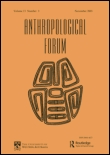
Anthropological Forum
Bridging Theory and Practice in AnthropologyAnthropological Forum, an esteemed journal in the field of anthropology, is published by Routledge Journals, Taylor & Francis Ltd. With an ISSN of 0066-4677 and an E-ISSN of 1469-2902, the journal has cemented its reputation for fostering critical discussions and innovative research since its inception in 1963. Covering a broad range of topics within anthropology, it has achieved an impressive Q1 ranking in the category of Anthropology and a Q2 ranking in Arts and Humanities (miscellaneous) in 2023, showcasing its pivotal role in advancing scholarly discourse. With a Scopus ranking placing it in the top 10% of its field, the journal provides valuable insights into contemporary anthropological issues, making it an essential resource for researchers, professionals, and students alike. Although not an open-access journal, the comprehensive studies and articles published within its pages contribute significantly to the academic and professional community. Addressed out of Milton Park, Abingdon, UK, the Anthropological Forum remains a seminal platform for disseminating high-quality anthropological research.

CURRENT ANTHROPOLOGY
Elevating Knowledge in Anthropology Since 1962CURRENT ANTHROPOLOGY, published by the esteemed University of Chicago Press, stands as a premier journal in the fields of anthropology and archaeology, with an impressive impact factor that signifies its relevance and authority in the academic community. With both print (ISSN: 0011-3204) and digital formats (E-ISSN: 1537-5382), this journal provides a platform for groundbreaking research, theoretical advancements, and critical discussions that shape our understanding of human cultures and societies. Since its inception in 1962, CURRENT ANTHROPOLOGY has continually pushed the boundaries of knowledge and inquiry, earning a prestigious Q1 ranking in 2023 across multiple categories, including Social Sciences and Archaeology. Researchers and professionals alike rely on this journal not only for its rigorous peer-reviewed articles but also for its commitment to interdisciplinary approaches and innovative methodologies. While not currently offering open access, CURRENT ANTHROPOLOGY remains an essential resource for students and scholars eager to stay abreast of the latest developments in anthropological research.
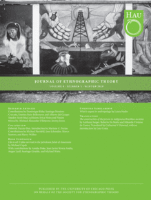
HAU-Journal of Ethnographic Theory
Advancing Ethnographic Insights for a Deeper Understanding of Humanity.HAU-Journal of Ethnographic Theory, published by University of Chicago Press, stands as a leading platform for scholarly discourse in the field of anthropology. Established in 2011, this esteemed journal focuses on ethnographic methodologies and theoretical advancements, offering a significant contribution to the understanding of human cultures and social practices. With an impressive Q2 ranking in anthropology and a strong placement in the 63rd percentile among peers in the Scopus rankings, HAU ensures high visibility and impact within the academic community. Although the journal currently does not offer open access, it is widely available for institutions, fostering a global dialogue among researchers, professionals, and students. As it converges its content towards 2024, HAU remains dedicated to publishing innovative research that challenges existing paradigms and encourages critical reflection, solidifying its importance in the continuous evolution of ethnographic theory.

DIALECTICAL ANTHROPOLOGY
Advancing Critical Theory in Social ResearchDIALECTICAL ANTHROPOLOGY, published by SPRINGER, is a prestigious journal within the field of anthropology, recognized for its substantial contributions to dialectical and critical theory in social research. Since its inception in 1975, the journal has carved a niche by exploring the intersections of culture, society, and politics, making it an essential resource for scholars and practitioners. With an impact factor that places it in the Q2 category for both anthropology and arts and humanities, and significant rankings in sociology and political science, it reflects a solid scholarly reputation. The journal operates on a subscription basis, allowing for a wide dissemination of rigorous academic research without open access. With ISSN 0304-4092 and E-ISSN 1573-0786, DIALECTICAL ANTHROPOLOGY serves as a crucial platform for fostering dialogue and advancing knowledge in contemporary anthropology and related disciplines. As a researcher, professional, or student, engaging with the insights presented in this journal will deepen your understanding of the dynamic interplay between structural and agency-oriented perspectives in social contexts.

Anthropology Today
Exploring the Depths of Human CulturesAnthropology Today, published by WILEY, is a leading peer-reviewed journal in the field of anthropology, boasting a distinguished Q1 category ranking in the 2023 evaluations and a notable position within the top 79th percentile of its discipline according to Scopus. Established in the United States, this journal offers a rich compendium of contemporary anthropological research, covering diverse topics that shape the understanding of human cultures and societies. It is recognized for its rigorous academic standards and commitment to publishing innovative studies that reflect current trends and discussions within the field. While the journal is not open access, it provides insightful articles and reviews that are indispensable for researchers, professionals, and students seeking to enhance their knowledge and stay updated with the latest anthropological findings and theoretical advancements.

Social Analysis
Unpacking the Dynamics of Human ExperienceSocial Analysis, an esteemed academic journal published by BERGHAHN JOURNALS, is at the forefront of interdisciplinary research, focusing on the dynamic intersections of anthropology, cultural studies, sociology, and the arts and humanities. Since its inception in 2002 and having transitioned to an Open Access model in 2020, the journal ensures that critical social research is widely accessible to scholars and the public alike. With an impressive Q1 ranking in Anthropology and cultural studies and holding a notable Q2 in Sociology and Political Science, it garners attention from a large academic audience, as evidenced by its high Scopus rankings: 10th in general arts and humanities and 153rd in cultural studies. This signifies its influential role in shaping contemporary discourse and providing a platform for innovative ideas and methodologies in understanding social phenomena. Based in Brooklyn, NY, the journal is dedicated to fostering scholarly dialogue and advancing the field, making it an essential resource for researchers, professionals, and students eager to engage with and contribute to the field of social analysis.
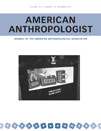
AMERICAN ANTHROPOLOGIST
Elevating interdisciplinary approaches in social sciences.American Anthropologist is a prestigious journal published by Wiley, dedicated to advancing the field of anthropology. With a rich publishing history dating back to 1888, it has become a leading platform for scholarly discourse, showcasing innovative research and diverse perspectives from around the globe. The journal holds impressive ranks within its categories, being recognized as Q1 in both Anthropology and Arts and Humanities, alongside a notable Scopus ranking of #36 out of 502 in Social Sciences. Its robust impact in academia is reflected in its emphasis on interdisciplinary approaches that resonate within the fields of social science and humanities. Researchers and students alike are encouraged to contribute to this vital resource that continues to shape anthropological thought and practice. For those interested, the journal is tailored for non-open access, ensuring the curation of high-caliber scholarly work accessible to a wide audience while supporting the standards of peer-reviewed publications.
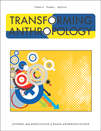
Transforming Anthropology
Advancing Transformative Ideas in AnthropologyTransforming Anthropology is a dynamic and influential journal in the field of Anthropology, published by Wiley. With an ISSN of 1051-0559 and an E-ISSN of 1548-7466, this journal has established a reputable position within academic circles, evidenced by its impressive Q2 rating in the 2023 category quartiles and a 77th percentile rank in the Scopus Ranks for Social Sciences. Since its inception, the journal has evolved to reflect contemporary anthropological discourse, addressing crucial issues from diverse perspectives. Although it does not currently operate under an Open Access model, its content remains accessible to a global readership eager to engage with pioneering research. Spanning converged years from 1990 to 1994 and 2010 to 2024, Transforming Anthropology serves as a vital platform for exploring transformative ideas and methodologies within the discipline. Researchers, professionals, and students alike can benefit from the scholarly contributions and insightful discussions fostered within its pages, making it an essential resource for anyone invested in the complexities of human culture and society.
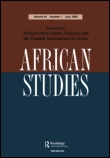
AFRICAN STUDIES
Advancing Interdisciplinary Insights on AfricaAFRICAN STUDIES, published by Routledge Journals, Taylor & Francis Ltd, is a leading academic journal that has been at the forefront of African research since its inception in 1942. With an impressive convergence of interdisciplinary insights covering Anthropology, Cultural Studies, History, and Political Science, this journal serves as an essential resource for scholars and practitioners alike. It boasts a notable impact within its field, ranking in the Q1 quartile for Cultural Studies and History and achieving a commendable Q2 for Anthropology, and Political Science and International Relations according to the 2023 category quartiles. Researchers can benefit from the journal's rigorous peer-review process, which ensures high-quality and impactful research dissemination. While it is not an open-access journal, it offers various subscription options for accessing its wealth of scholarly articles. With a commitment to advancing understanding of African contexts and perspectives, AFRICAN STUDIES plays a crucial role in shaping contemporary debates and fostering intellectual engagement within the academic community.

Boletin Antropologico
Advancing Anthropological Discourse and UnderstandingBoletin Antropologico, published by UNIV LOS ANDES, is a vital academic journal dedicated to the field of anthropology, focusing on the diverse cultural practices, social structures, and historical contexts of societies, particularly within Latin America. With its ISSN of 0257-750X, this journal aims to provide a platform for researchers and scholars to disseminate their findings and engage in meaningful discussions that advance the understanding of anthropological issues. Although Boletin Antropologico currently does not follow an open-access model, it remains a significant resource for professionals seeking peer-reviewed content that reflects rigorous academic standards. With a commitment to fostering intellectual growth and collaboration among anthropologists, the journal serves as an essential reference for students and practitioners keen on exploring the rich tapestry of human cultures and societies.